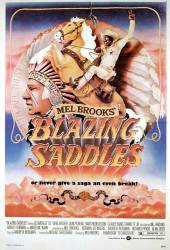Deliberate mistake: In the beginning, when the two black workers are using the handcart, they bend their arms as they crouch down to give the illusion that they are slipping into the quicksand. (00:06:30)

Blazing Saddles (1974)
1 deliberate mistake
Directed by: Mel Brooks
Starring: Gene Wilder, Mel Brooks, Slim Pickens, Cleavon Little, Harvey Korman
Continuity mistake: When Mongo enters Rock Ridge on the steer, the cuff on the chain around his neck instantly switches from open end facing left to facing right in the next cut.
Bart: Well, can't you see that's the last act of a desperate man?
Howard Johnson: We don't care if it's the first act of "Henry V, " we're leaving!
Question: At the beginning, Lyle refers to the song Camptown races as "The Camptown lady"? Is this simply cause he's stupid, or is there any other reason?
Join the mailing list
Separate from membership, this is to get updates about mistakes in recent releases. Addresses are not passed on to any third party, and are used solely for direct communication from this site. You can unsubscribe at any time.
Check out the mistake & trivia books, on Kindle and in paperback.




Chosen answer: The opening line of the song refers to the Camptown Ladies and the phrase "Camptown Races" never appears anywhere in the lyrics. If nobody told him otherwise, Lyle may simply have assumed that some variation on "Camptown Ladies" was the actual title.
Tailkinker ★
The actual title of the song was "Gwine to Run All Night, or De Camptown Races," written by American lyricist Stephen Foster and first published in 1850. Over many years on the minstrel show circuit, the title was shortened to "Camptown Races" and was sometimes erroneously called "Camptown Ladies." While the phrase "Camptown Races" doesn't appear in the lyrics, the phrase "Camptown Racetrack" does appear in the second line: "Camptown ladies sing dis song, doo-dah, doo-dah, Camptown Racetrack five miles long, oh-de-doo-dah-day." The song refers to Camptown, Pennsylvania, a real town with a popular horserace in the mid-1800s.
Charles Austin Miller